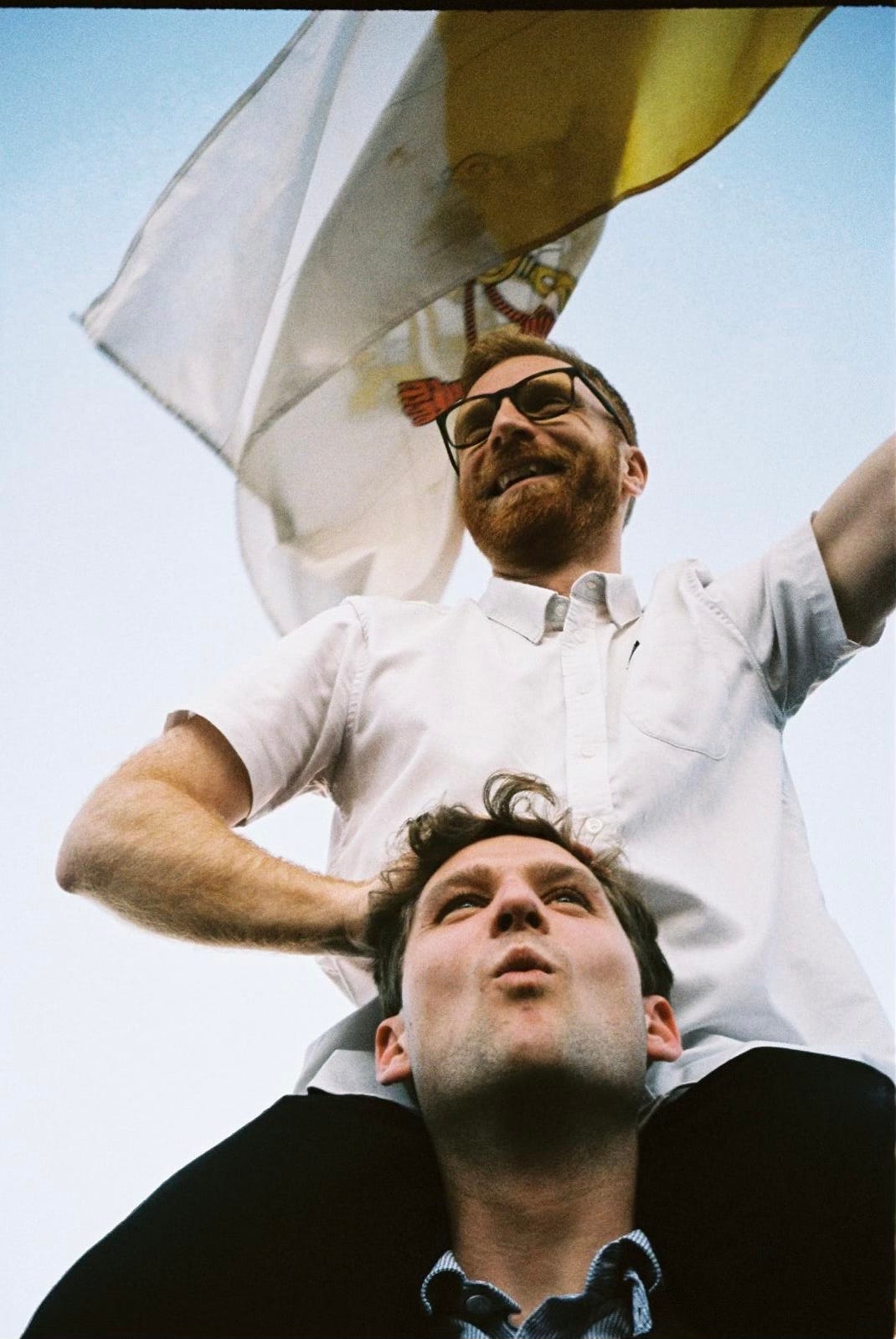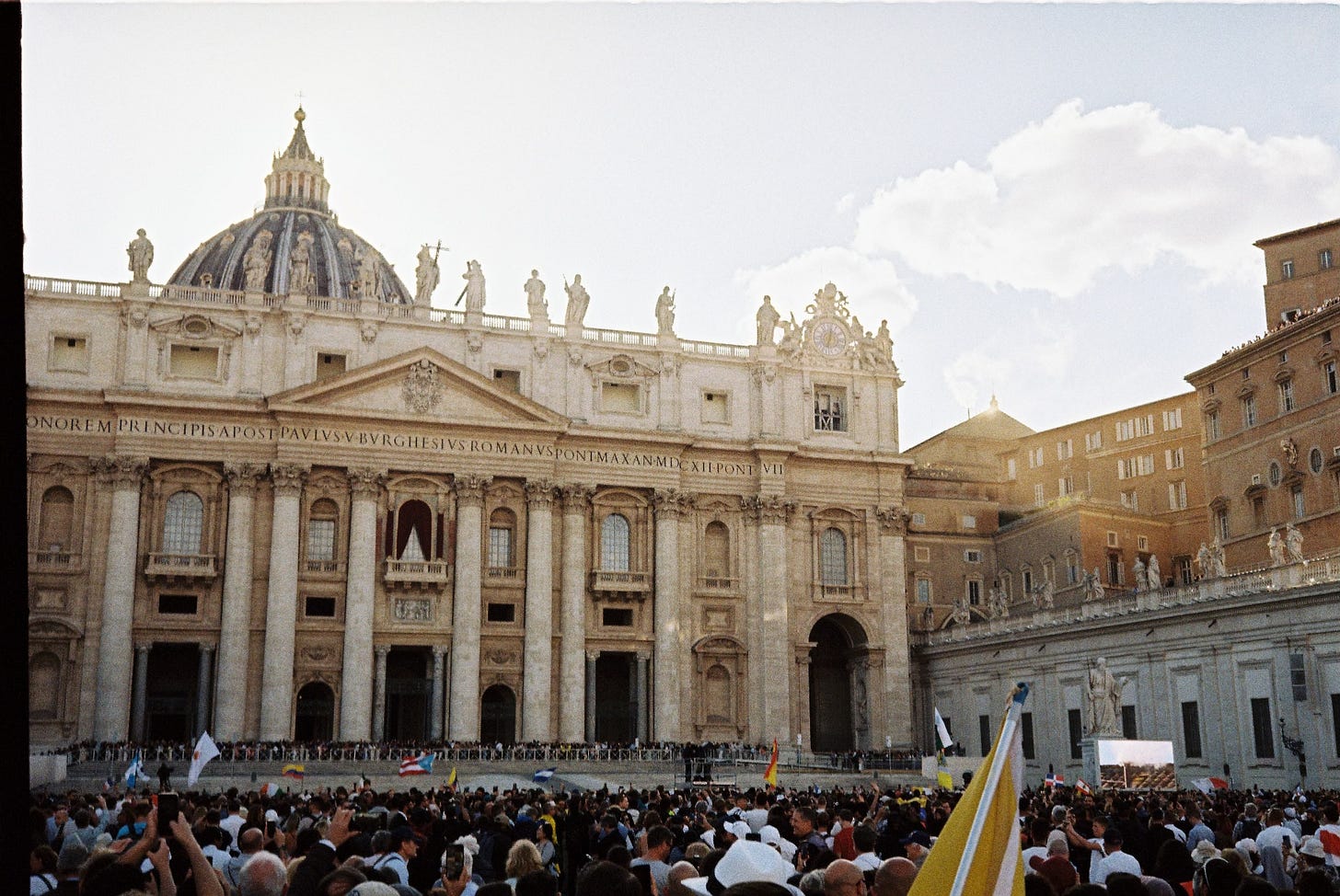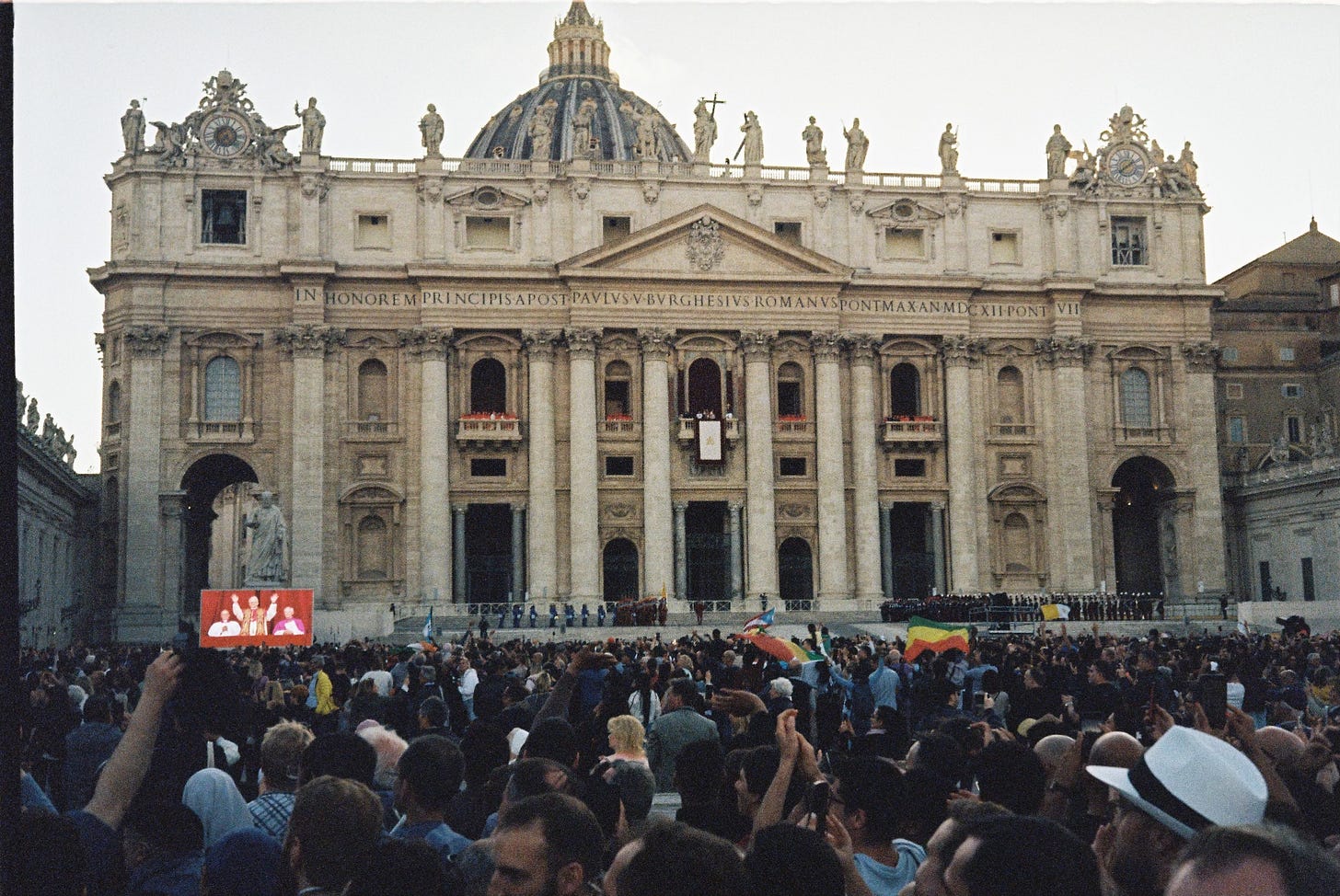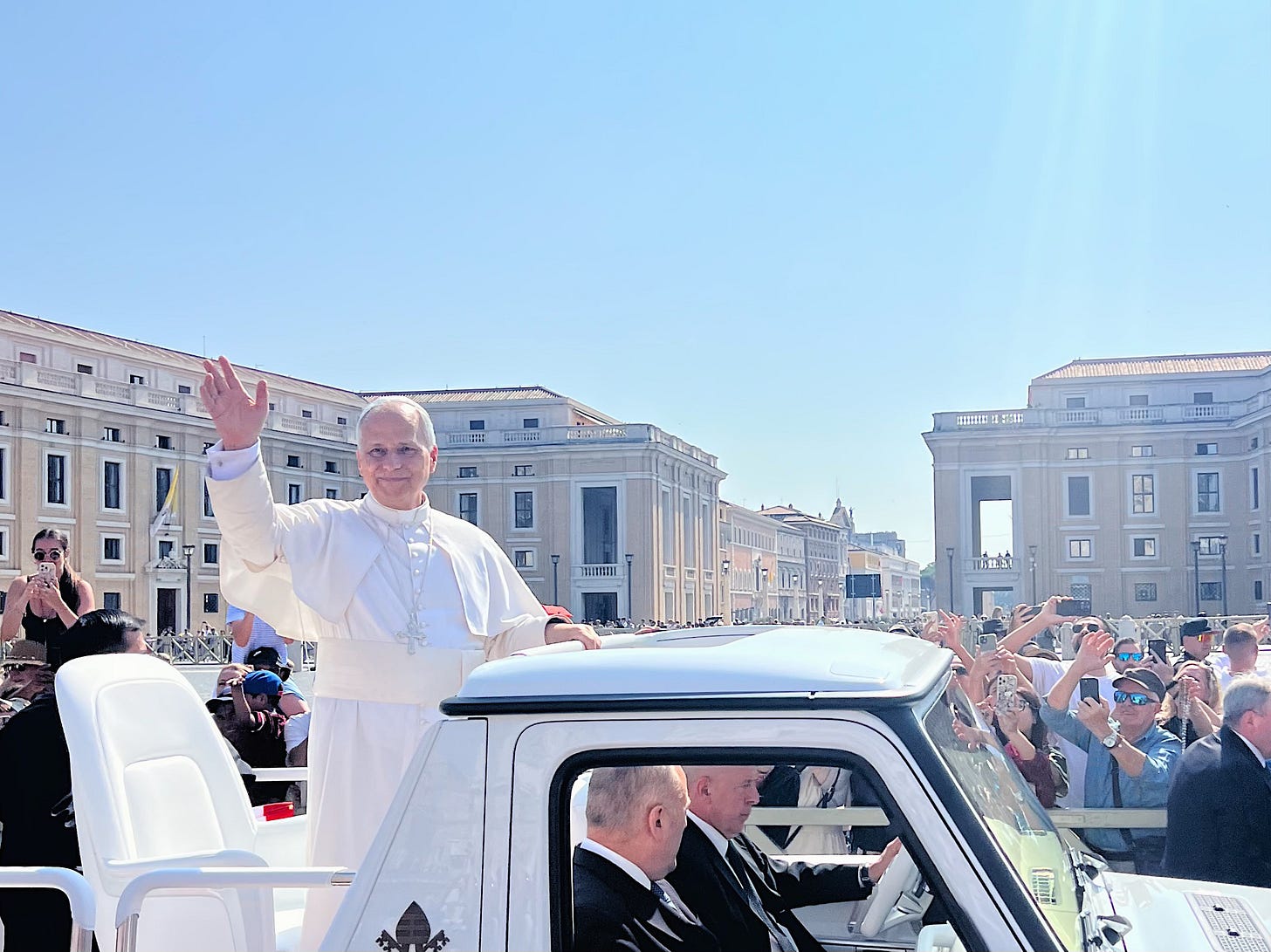Habemus Papam!
Witnessing history unfold in Rome
I’ll never forget the first time I saw the Successor of St. Peter in person. In 2015, Pope Francis made his apostolic visit to Washington, DC, where I was living at the time. I had only just started the process of becoming Catholic. He visited Capitol Hill and became the first Pope to address a joint session of the U.S. Congress, and I joined the large crowd on the west lawn of the Capitol to watch on outdoor screens. After his speech, Pope Francis appeared on the famous Speaker’s Balcony of the Capitol building to greet the roaring crowd. Francis was flanked by many of America’s most powerful politicians, including Vice President Joe Biden and the Big Four congressional leaders: Speaker John Boehner, Nancy Pelosi, Mitch McConnell, and Harry Reid.
I remember experiencing, in that moment, an internal shift of my center of gravity. Until then, American politics and the U.S. Capitol building had been the axis around which my world revolved. Politics was everything to me. But as I stood gazing up at Pope Francis on that balcony, the 266th Bishop of Rome and the Successor of St. Peter, it was like the ground shifted under my feet.
Here was this humble man, surrounded by some of the most powerful people in the world, and yet he was somehow more important than any of them, and you could tell the politicians knew it. The significance of these political leaders paled in comparison, not because of who Francis was as a person, but because of the office he held and the authority he wielded as delegated by Christ. As my journey to Catholicism unfolded over the following months, the axis of my attention continued to shift: from Washington to Rome, from political power to spiritual authority, from the U.S. Capitol to the Chair of St. Peter.
This first glimpse of the Roman Pontiff was at the forefront of my mind as I watched his successor walk out onto an even more famous balcony to greet an even larger roaring crowd.
The Anticipation
I wrote previously about my experience in Rome during the death, lying in state, and funeral of Pope Francis. As surreal as that week was, it was totally eclipsed by what came next.
The week after Pope Francis’ funeral was a flurry of anticipation. Rome quickly switched gears from respectful mourning to a buzz of rumors and speculation about who might be his successor. Lots of names were thrown around, the most common being Cardinals Parolin, Tagle, Pizzaballa, Zuppi, Ambongo, and Erdő. The common consensus seemed to be that if someone was elected in the first few days, it would likely be Parolin, or possibly Tagle or Erdő. If the conclave went on longer, then anything could happen. At least a dozen additional names were mentioned as possible compromise candidates, and at the very end of these lists, people occasionally included Cardinal Robert Prevost, always adding the caveat: “but he’s an American, and there will never be an American pope.”
In the few days leading up to the conclave, however, I heard the name Prevost whispered by more and more people who I knew were at least somewhat plugged into the process and not just getting their news from CNN. He checked every box, but still… “there will never be an American pope.”
Like millions of others, I watched the beginning of the conclave online. Despite the fact that it was happening just two miles away, I had a big work event, and everything was happening inside and in private anyway. I remember getting chills watching the 140+ cardinals solemnly process into the Sistine Chapel amid the chanting of the Litany of Saints, knowing that one of these men would walk out of that room as the Vicar of Christ. I wondered what it must feel like entering that chapel, with Michelangelo’s famous Last Judgment staring down at you, knowing that there was a chance that the weight of the world could fall on your shoulders.
A few hours later, I joined tens of thousands of onlookers right after work in St. Peter’s Square. The first vote of the conclave was expected to finish around 7:00 pm. No one was expected to be elected, and the first vote is typically seen as a sort of test vote to see where everyone stands. We all expected to see black smoke around 7:00 pm before heading home for dinner.
Except that 7:00 pm came and went, and there was no black smoke. Another hour went by, and still no black smoke. The crowd was getting anxious (and hungry). Of course, the schedule that had circulated was just an estimate based on past precedent, but it was still very late. My friends and I started to wonder, could the unthinkable have happened? Could someone have received the necessary 2/3 majority on the very first ballot and was now in the process of accepting the office? Surely not!
As the clock on the facade of St. Peter’s Basilica inched closer to 9:00 pm, I contemplated giving up and going home. The crowd grew agitated and began to thin out. Then, exactly at 9:00 pm, the video screens that had a live feed of the chimney above the Sistine Chapel suddenly turned off. I assume they were on a timer or something, and no one predicted the voting would go so late! But then, seconds later, thick black smoke began to rise out of the chimney, still just visible against the darkening Roman sky. The video screens suddenly came back on, and it was clear for the whole world to see: no pope had been elected.
Day two of the conclave dawned as a glorious sunny day in Rome. Very few people expected someone to be elected during any of the four votes scheduled that day, but the city was alive with anticipation. The conclave would be in full swing, and the city was eager to meet the next Bishop of Rome.
As expected, no one was elected during the first two votes of the day (and 2nd and 3rd votes overall), and black smoke billowed out of the chimney above the Sistine Chapel just before noon, right on schedule.
Even though I didn’t think there was much of a chance of white smoke that evening, I still made plans with some friends to meet in St. Peter’s Square after work. We coordinated bringing meats and cheeses, and planned to make a picnic of it while we waited for the likely black smoke.
I arrived in the Square around 5:00 pm, and if someone had been elected on the first afternoon ballot (the 4th overall ballot), we expected to see white smoke around 5:30 pm. If no one was elected, then the cardinals would proceed directly to the next ballot, and we would either see black or white smoke around 7:00 pm.
It was a festive atmosphere, with a lot of people singing and waving flags. I gathered with a big group of friends as 5:30 pm came and went. By 6:00 pm, we assumed no one had been elected and were hunkered down to wait at least another hour for smoke. People were just sitting on the ground and chatting, and I had given up staring at the tiny chimney above the Sistine Chapel for the time being.
Then, at 6:07 pm, there was a roar that sounded like an airplane engine revving up. It got louder and louder as more people realized that, high above us, bright white smoke was billowing out of the chimney. Immediately, people started running towards the front of the Square and packed in like sardines to get as close as we could to the famous balcony in the middle of St. Peter’s Basilica. Now the festival atmosphere really took off. People were crying, singing, and dancing. We knew we had to wait another hour or so before the appointed cardinal would appear on the balcony and announce to us, and the world, who had been elected.
While we waited to learn who the new pope was, there was a paradoxically blissful hour when we had a pope but didn’t yet know who he was. While bursting with anticipation, I recall thinking that, in that moment, I was simply thankful for the office of the papacy in its purest form. Of course, it’s wonderful to love individual popes, but I had this unique moment to be grateful for the gift of the office of Peter, that mysterious chain linking each Bishop of Rome back to the apostle Christ chose to be His vicar, the visible shepherd of His flock on Earth.
In that hour before learning who our new Vicar of Christ was, I felt an overwhelming gratitude to be Catholic. It’s still hard to describe. There was a palpable joy and relief in the Square as the realization dawned that, once again, we had a shepherd here on Earth, not to replace Christ, but to unify us and guide us ever more fully toward Him. The pope is not Christ. He is a servant, a signpost, the servant of the servants of God, always pointing beyond himself to the true Good Shepherd. I know from experience that the idea of the papacy can be a huge stumbling block for non-Catholics, but I have come to thank God daily for the office of Peter and the authority entrusted to it for the sake of unity and truth.
While the man changes, the mission remains the same: to echo Peter’s ancient confession, "You are the Christ, the Son of the living God," and to be the rock that helps the Church keep proclaiming it up and down the centuries. Without even knowing his name, the crowd was joyfully chanting “Viva il Papa!”
Habemus Papam!
At 7:12 pm, just over an hour after white smoke had first appeared, Cardinal Mamberti walked out on the balcony to announce the news.
He clearly savored the moment, taking a painfully long pause as the crowd fell silent, waiting to hear. He knew he had the world’s biggest secret and enjoyed the moment as humanity collectively held its breath.
Finally, he uttered the ancient and familiar formula in Latin:
Annuntio vobis gaudium magnum; habemus Papam!
I announce to you a great joy; We have a Pope!
The crowd went wild! Oh how I had longed to hear those words in person. I’m a sucker for pageantry and pomp and circumstance. I had gone back and watched news coverage of the past three papal elections, of John Paul II, Benedict XVI, and Francis. Even before becoming Catholic, I dreamed of standing in St. Peter’s Square to hear these words.
That dream was now a reality, and it was difficult to take in. Tears in my eyes, I silently waited with the crowd to hear the name. 150,000+ people all crammed together, and you could hear a pin drop as we waited to hear the name announced. Cardinal Mamberti continued for the world to hear:
Eminentissimum ac Reverendissimum Dominum,
Dominum Robertum Franciscum
Sanctae Romanae Ecclesiae Cardinalem Prevost
qui sibi nomen imposuit LEONEM XIV
The most eminent and most reverend Lord Robert Francis, Cardinal of the Holy Roman Church, Prevost, who has taken the name LEO XIV.
Stunned. As he said the word Prevost, most people were looking around, asking themselves, “who the heck is that?!”
At the utterance of Robert Francis, however, I knew, and I lost my mind. I’m on video yelling, “We have an American Pope!!”
Even though I had heard his name circulating, I hadn’t taken it very seriously. Like everyone else, I assumed there would never be an American pope, at least not in my lifetime. Also, like everyone else there, I knew very little about him. Just that he had been born in the US, but had spent much of his priesthood as a missionary and eventually as a bishop in Peru.
There was no cell service in the Square to do any quick online research. I was sure the rest of the world, stunned as we were, would be receiving a hastily assembled biography from someone on CNN, pulling it from the bottom of the pile of possible candidates. We were left to just enjoy the moment, not worry about the specifics of the cardinal who had just been elected, but focus at that moment on celebrating and praying for the man we were about to meet.
As soon as the name was announced, the windows to the side of the famous balcony were flung open, and the 140+ cardinals who had just elected the first American pope crammed onto the side balconies to join the celebration. A few minutes later, the curtains behind the central balcony parted, and we, and the whole world watching, got our first look at Leo XIV!
He walked out onto the balcony, and I felt like I was in a movie scene, and this was not real life. To participate in the moment, a moment I had known so well from previous videos and had longed to witness in person. Before he said a single word, I was totally hooked and captivated by our new Pope Leo. Something about his paradoxically humble yet confident presence drew me, and everyone else in the Square, in.
Speaking in a clear Italian I could mostly understand, Pope Leo XIV greeted us with the words of Christ: “Peace be with you all!” It was a comforting surprise that he came out to the balcony with prepared remarks. This was indicative of what we have come to expect from him over his first weeks as pope: he is clearly careful and intentional with all of his words and actions.
Therefore, without fear, united, hand in hand with God and with one another, let us move forward. We are disciples of Christ, Christ goes before us; the world needs His light, humanity needs Him as a bridge to be reached by God and His love. Help us as well—help one another—to build bridges through dialogue, through encounter, uniting everyone to be one single people always in peace.
Following his prepared remarks, he imparted the solemn Urbi et Orbi blessing (to the city and the world) that popes only give on the occasion of their election, and at Christmas and Easter. The same blessing that Pope Francis had given on Easter Sunday, just a few weeks earlier, as one of his final acts in this life.
After Pope Leo waved goodbye to the crowd and walked back into St. Peter’s Basilica, everyone kept chanting his name. It was a giddy atmosphere. Of course, we had to keep the celebrations going. A group of us meandered over to our favorite watering hole, Bar Peru (aptly named!), so we could properly toast our new pontiff. Naturally, celebrations and chants of “Viva Papa Leone!” continued until the bar kicked us out at 2:00 am.
Getting to know Papa Leone
As I write this, it’s now been exactly two months since the world first met Pope Leo XIV. In that time, I’ve had the chance to attend his Inaugural Mass in St. Peter’s Square, several Sunday Angelus and Regina Caeli addresses where he greets the crowds from the papal apartment balcony, and two Wednesday Audiences, where he gives his weekly catechesis and rides through the Square in the popemobile.
It’s incredible to reflect on how much my life has changed in the nearly ten years between first seeing the Bishop of Rome on the balcony of the U.S. Capitol and now watching the first American pope step onto the balcony of St. Peter’s Basilica. Not only has my professional life shifted away from American politics and toward working for the Church, but my personal and spiritual center of gravity has continued along the trajectory that began a decade ago. The outward reality of living in Rome rather than Washington, DC, mirrors an inner transformation as much as a geographic one.
It’s been surreal to watch history continue to unfold in the Eternal City. Every day, I’m surrounded by ruins of the great Roman Empire: my office overlooks the Roman Forum, and my commute takes me past the spot where Julius Caesar was stabbed. This city was once the political center of the world. Now, the very people the Romans persecuted stand above their ruins, both literally and figuratively. A massive statue of St. Peter now stands above Trajan’s victory column, and St. Paul above that of Marcus Aurelius. On the sites of Peter and Paul’s tombs stand two of the most magnificent churches in the world, not as relics of a bygone era, but as living, breathing houses of worship, proclaiming and adoring Christ, crucified and risen, the true King above all earthly empires.
It's impossible not to think about the events and people this city has witnessed over the millennia: the rise and fall of empires, great saints and cruel despots, and some of the most brilliant artists in human history... and now, Fr. Bob from the Midwest becoming the 266th Successor of St. Peter. The paradox of Rome: ever ancient and ever new.
I’d be lying if I said my heart hasn’t swollen with pride at the idea of an American pope. The fact that our young country, founded by mostly Protestants and deists (shout out to Catholic Founding Fathers like Charles Carroll!), could offer one of our sons to the Church and to the world in this way is a truly extraordinary thing. In a very real way, however, Fr. Bob from Chicago no longer exists. Now, as Pope Leo XIV, he is the servant of the servants of God, and transcending all nationalities, he is tasked with shepherding the whole world towards Christ, the Son of the living God.
While the world is still justifiably stunned at the idea of an American citizen elected pope, I don’t think we’ve yet fully grasped the profound potential impact of having a native English-speaking pope, the first since Pope Adrian IV in the 12th century. The recent popes each had many strengths, but mastery of the English language was not one of them. Every time Pope Leo XIV speaks in English, I get chills. In an era of viral video clips and global social media, the ability for his words to reach millions directly, without translation, is astonishing. Just this past week, he spoke in English during his Sunday Angelus address, expressing his solidarity and prayers for the people of Texas recovering from the devastating floods.
I truly believe we stand at the beginning of a Leonine Revival and a new era of (re)evangelization not only in the United States, but around the world.
As we step into this new chapter with Pope Leo XIV, I find myself more hopeful than ever. History may never stop unfolding in Rome, but through it all, Jesus Christ remains the same yesterday, today, and forever.
The day after his election, Pope Leo returned to the Sistine Chapel with the College of Cardinals to celebrate his first Holy Mass as pope. His Christocentric homily was incredible and deserves to be read in full. I leave you with an excerpt, which I believe will become a defining theme of Pope Leo XIV’s pontificate:
Even today, there are many settings in which the Christian faith is considered absurd, meant for the weak and unintelligent. Settings where other securities are preferred, like technology, money, success, power, or pleasure.
These are contexts where it is not easy to preach the Gospel and bear witness to its truth, where believers are mocked, opposed, despised or at best tolerated and pitied. Yet, precisely for this reason, they are the places where our missionary outreach is desperately needed. A lack of faith is often tragically accompanied by the loss of meaning in life, the neglect of mercy, appalling violations of human dignity, the crisis of the family and so many other wounds that afflict our society.
Today, too, there are many settings in which Jesus, although appreciated as a man, is reduced to a kind of charismatic leader or superman. This is true not only among non-believers but also among many baptized Christians, who thus end up living, at this level, in a state of practical atheism.
This is the world that has been entrusted to us, a world in which, as Pope Francis taught us so many times, we are called to bear witness to our joyful faith in Jesus the Saviour. Therefore, it is essential that we too repeat, with Peter: “You are the Christ, the Son of the living God” (Mt 16:16).
It is essential to do this, first of all, in our personal relationship with the Lord, in our commitment to a daily journey of conversion. Then, to do so as a Church, experiencing together our fidelity to the Lord and bringing the Good News to all (cf. Lumen Gentium, 1).






